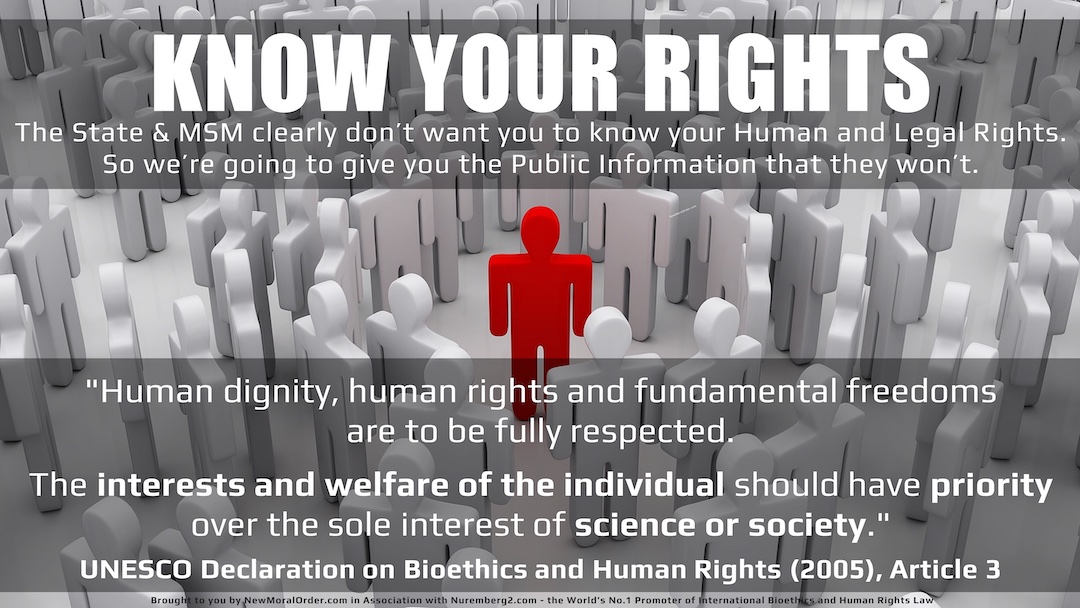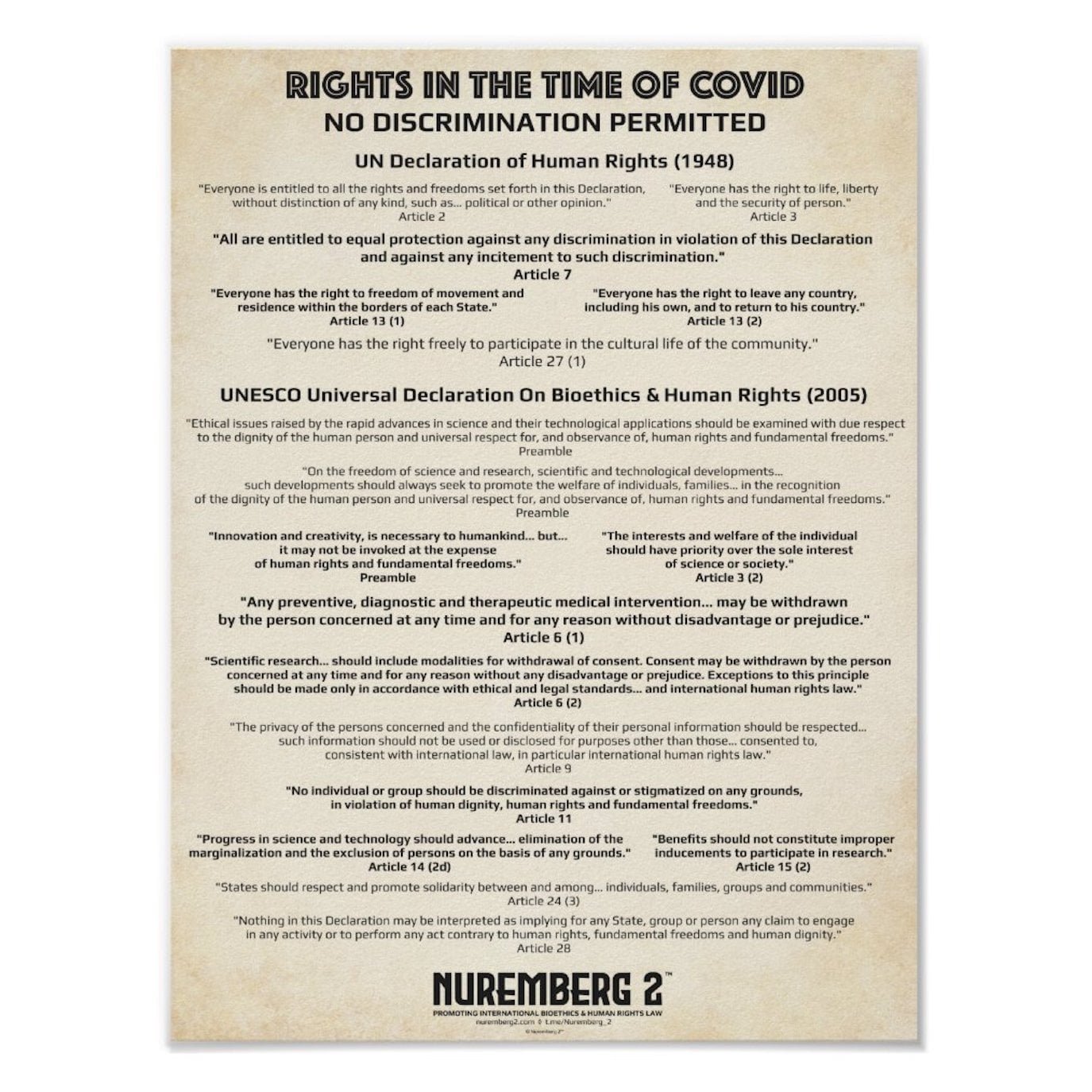New Moral Order™
SOVEREIGN RIGHTS
Rights in the Time of Covid™
+ Nuremberg 2™
#SovereignRights #Nuremberg2
New Moral Order™
RIGHTS IN THE TIME OF COVID™
Know Your Rights
“NO DISCRIMINATION PERMITTED”
International Bioethics & Human Rights Laws
THE NUREMBERG CODE (1947)
“The person involved [participant in the experiment] should… be able to exercise free power of choice, without the intervention of any element of force, fraud, deceit, duress, overreaching, or other ulterior form of constraint or coercion.”
The Nuremberg Code (1947) Article 1
UN DECLARATION OF HUMAN RIGHTS (1948)
“Everyone is entitled to all the rights and freedoms set forth in this Declaration, without distinction of any kind, such as… political or other opinion.”
UN Declaration of Human Rights (1948) Article 2
“Everyone has the right to life, liberty and the security of person.”
UN Declaration of Human Rights (1948) Article 3
“All are entitled to equal protection against any discrimination in violation of this Declaration and against any incitement to such discrimination.”
UN Declaration of Human Rights (1948) Article 7
“Everyone has the right to equal access to public service in his country.”
UN Declaration of Human Rights (1948) Article 21 (2)
“Everyone has the right freely to participate in the cultural life of the community.”
UN Declaration of Human Rights (1948) Article 27 (1)
UNESCO UNIVERSAL DECLARATION ON BIOETHICS & HUMAN RIGHTS (2005)
“Ethical issues raised by the rapid advances in science and their technological applications should be examined with due respect to the dignity of the human person and universal respect for, and observance of, human rights and fundamental freedoms.”
UNESCO Universal Declaration on Bioethics & Human Rights (2005) Preamble
“On the freedom of science and research, scientific and technological developments… such developments should always seek to promote the welfare of individuals, families… in the recognition of the dignity of the human person and universal respect for, and observance of, human rights and fundamental freedoms.”
UNESCO Universal Declaration on Bioethics & Human Rights (2005) Preamble
“Innovation and creativity, is necessary to humankind… but… it may not be invoked at the expense of human rights and fundamental freedoms.”
UNESCO Universal Declaration on Bioethics & Human Rights (2005) Preamble
“All human beings, without distinction, should benefit from the same high ethical standards in medicine and life science research.”
UNESCO Universal Declaration on Bioethics & Human Rights (2005) Preamble
“[This declaration aims] to… protect human rights, by ensuring… fundamental freedoms, consistent with international human rights law.”
UNESCO Universal Declaration on Bioethics & Human Rights (2005) Article 2 (c)
“[This declaration aims] to recognize… the need for… research and developments to occur within the framework of ethical principles… and to respect human dignity, human rights and fundamental freedoms.”
UNESCO Universal Declaration on Bioethics & Human Rights (2005) Article 2 (d)
“Human dignity, human rights and fundamental freedoms are to be fully respected.”
UNESCO Universal Declaration on Bioethics & Human Rights (2005) Article 3 (1)
“The interests and welfare of the individual should have priority over the sole interest of science or society.”
UNESCO Universal Declaration on Bioethics & Human Rights (2005) Article 3 (2)
“Any preventive, diagnostic and therapeutic medical intervention… may be withdrawn by the person concerned at any time and for any reason without disadvantage or prejudice.”
UNESCO Universal Declaration on Bioethics & Human Rights (2005) Article 6 (1)
“Scientific research… should include modalities for withdrawal of consent. Consent may be withdrawn by the person concerned at any time and for any reason without any disadvantage or prejudice. Exceptions to this principle should be made only in accordance with ethical and legal standards… and international human rights law.”
UNESCO Universal Declaration on Bioethics & Human Rights (2005) Article 6 (2)
“The privacy of the persons concerned and the confidentiality of their personal information should be respected… such information should not be used or disclosed for purposes other than those… consented to, consistent with international law, in particular international human rights law.”
UNESCO Universal Declaration on Bioethics & Human Rights (2005) Article 9
“The fundamental equality of all human beings in dignity and rights is to be respected so that they are treated justly and equitably.”
UNESCO Universal Declaration on Bioethics & Human Rights (2005) Article 10
“No individual or group should be discriminated against or stigmatized on any grounds, in violation of human dignity, human rights and fundamental freedoms.”
UNESCO Universal Declaration on Bioethics & Human Rights (2005) Article 11
“The importance of cultural diversity and pluralism should be given due regard. However, such considerations are not to be invoked to infringe upon human dignity, human rights and fundamental freedoms.”
UNESCO Universal Declaration on Bioethics & Human Rights (2005) Article 12
“Progress in science and technology should advance… elimination of the marginalization and the exclusion of persons on the basis of any grounds.”
UNESCO Universal Declaration on Bioethics & Human Rights (2005) Article 14 (2d)
“Benefits should not constitute improper inducements to participate in research.”
UNESCO Universal Declaration on Bioethics & Human Rights (2005) Article 15 (2)
“Independent, multidisciplinary and pluralist ethics committees should be established… in order to: assess the relevant ethical, legal, scientific and social issues related to research projects involving human beings.”
UNESCO Universal Declaration on Bioethics & Human Rights (2005) Article 19 (a)
“Independent, multidisciplinary and pluralist ethics committees should be established… in order to: foster debate, education and public awareness of, and engagement in, bioethics.”
UNESCO Universal Declaration on Bioethics & Human Rights (2005) Article 19 (d)
“States, public and private institutions… should endeavour to ensure that any activity within the scope of this Declaration… is consistent with the principles set out in this Declaration.”
UNESCO Universal Declaration on Bioethics & Human Rights (2005) Article 21 (1)
“States should take all appropriate measures, whether of a legislative, administrative or other character, to give effect to the principles set out in this Declaration in accordance with international human rights law… supported by action in the spheres of education, training and public information.”
UNESCO Universal Declaration on Bioethics & Human Rights (2005) Article 22 (1)
“States should encourage the establishment of independent, multidisciplinary and pluralist ethics committees.”
UNESCO Universal Declaration on Bioethics & Human Rights (2005) Article 22 (2)
“To achieve a better understanding of the ethical implications of scientific and technological developments, in particular for young people, States should endeavour to foster bioethics education and training at all levels.”
UNESCO Universal Declaration on Bioethics & Human Rights (2005) Article 23 (1)
“States should encourage the participation of… regional and national non governmental organizations in this endeavour.”
UNESCO Universal Declaration on Bioethics & Human Rights (2005) Article 23 (2)
“States should foster… and encourage the free flow and sharing of scientific and technological knowledge.”
UNESCO Universal Declaration on Bioethics & Human Rights (2005) Article 24 (1)
“States should respect and promote solidarity between and among… individuals, families, groups and communities.”
UNESCO Universal Declaration on Bioethics & Human Rights (2005) Article 24 (3)
“Nothing in this Declaration may be interpreted as implying for any State, group or person any claim to engage in any activity or to perform any act contrary to human rights, fundamental freedoms and human dignity.”
UNESCO Universal Declaration on Bioethics & Human Rights (2005) Article 28
The above Bioethics and Human Rights list “No Discrimination Permitted” was provided by Nuremberg2.com.
You can find many more topical, categorised lists, and other important information on Bioethics and Human Rights Law at the Nuremberg2.com website.
New Moral Order™
RIGHTS IN THE TIME OF COVID™
Ways to Promote
Bioethics & Human Rights
GO TO THE NUREMBERG 2™ PROMOTION STORE
New Moral Order™
RIGHTS IN THE TIME OF COVID™
Know Your Rights
“SOVEREIGNTY OF THE INDIVIDUAL”
International Bioethics & Human Rights Laws
THE NUREMBERG CODE (1947)
“The voluntary consent of the human subject is absolutely essential.”
The Nuremberg Code (1947) Article 1
“The person involved [participant in the experiment] should… be able to exercise free power of choice, without the intervention of any element of force, fraud, deceit, duress, overreaching, or other ulterior form of constraint or coercion.”
The Nuremberg Code (1947) Article 1
“The human subject should be at liberty to bring the experiment to an end… where continuation of the experiment seems to him to be impossible.”
The Nuremberg Code (1947) Article 9
UN DECLARATION OF HUMAN RIGHTS (1948)
“Everyone has the right to life, liberty and the security of person.”
UN Declaration of Human Rights (1948) Article 3
“No one shall be subjected to arbitrary interference with his privacy, family, home or correspondence.”
UN Declaration of Human Rights (1948) Article 12
“Everyone has the right to freedom of thought [and] conscience… and freedom, either alone or in community with others and in public or private, to manifest his… belief in teaching, practice… and observance.”
UN Declaration of Human Rights (1948) Article 18
“Everyone has the right to freedom of opinion and expression; this right includes freedom to hold opinions without interference and to seek, receive and impart information and ideas through any media and regardless of frontiers.”
UN Declaration of Human Rights (1948) Article 19
“Everyone has the right to freedom of peaceful assembly and association.”
UN Declaration of Human Rights (1948) Article 20 (1)
“Everyone, as a member of society… is entitled to realization… in accordance with… cultural rights indispensable for his dignity and the free development of his personality.”
UN Declaration of Human Rights (1948) Article 22
“Education shall be directed to the full development of the human personality and to the strengthening of respect for human rights and fundamental freedoms.”
UN Declaration of Human Rights (1948) Article 26 (2)
“Parents have a prior right to choose the kind of education that shall be given to their children.”
UN Declaration of Human Rights (1948) Article 26 (3)
“Everyone has the right freely to participate in the cultural life of the community.”
UN Declaration of Human Rights (1948) Article 27 (1)
UNESCO UNIVERSAL DECLARATION ON BIOETHICS & HUMAN RIGHTS (2005)
“Ethical issues raised by the rapid advances in science and their technological applications should be examined with due respect to the dignity of the human person and universal respect for, and observance of, human rights and fundamental freedoms.”
UNESCO Universal Declaration on Bioethics & Human Rights (2005) Preamble
“On the freedom of science and research, scientific and technological developments… such developments should always seek to promote the welfare of individuals, families… in the recognition of the dignity of the human person and universal respect for, and observance of, human rights and fundamental freedoms.”
UNESCO Universal Declaration on Bioethics & Human Rights (2005) Preamble
“Decisions regarding ethical issues in medicine, life sciences and associated technologies may have an impact on individuals, families, groups or communities and humankind as a whole.”
UNESCO Universal Declaration on Bioethics & Human Rights (2005) Preamble
“Innovation and creativity, is necessary to humankind… but… it may not be invoked at the expense of human rights and fundamental freedoms.”
UNESCO Universal Declaration on Bioethics & Human Rights (2005) Preamble
“A person’s identity includes biological, psychological, social, cultural and spiritual dimensions.”
UNESCO Universal Declaration on Bioethics & Human Rights (2005) Preamble
“The interests and welfare of the individual should have priority over the sole interest of science or society.”
UNESCO Universal Declaration on Bioethics & Human Rights (2005) Article 3 (2)
“The autonomy of persons to make decisions… is to be respected.”
UNESCO Universal Declaration on Bioethics & Human Rights (2005) Article 5
“Scientific research should only be carried out with the prior, free, express and informed consent of the person concerned.”
UNESCO Universal Declaration on Bioethics & Human Rights (2005) Article 6 (2)
“Scientific research… should include modalities for withdrawal of consent. Consent may be withdrawn by the person concerned at any time and for any reason without any disadvantage or prejudice. Exceptions to this principle should be made only in accordance with ethical and legal standards… and international human rights law.”
UNESCO Universal Declaration on Bioethics & Human Rights (2005) Article 6 (2)
“In no case should a collective community agreement or the consent of a community leader or other authority substitute for an individual’s informed consent.”
UNESCO Universal Declaration on Bioethics & Human Rights (2005) Article 6 (3)
“Special protection is to be given to persons who do not have the capacity to consent: authorization for research and medical practice should be obtained in accordance with the best interest of the person concerned… the person concerned should be involved to the greatest extent possible in the decision-making process of consent, as well as that of withdrawing consent.”
UNESCO Universal Declaration on Bioethics & Human Rights (2005) Article 7 (a)
“Special protection is to be given to persons who do not have the capacity to consent: research should only be carried out for his or her direct health benefit… exposing the person only to a minimal risk and minimal burden… compatible with the protection of the individual’s human rights. Refusal of such persons to take part in research should be respected.”
UNESCO Universal Declaration on Bioethics & Human Rights (2005) Article 7 (b)
“Human vulnerability should be taken into account… and the personal integrity of such individuals respected.”
UNESCO Universal Declaration on Bioethics & Human Rights (2005) Article 8
“No individual or group should be discriminated against or stigmatized on any grounds, in violation of human dignity, human rights and fundamental freedoms.”
UNESCO Universal Declaration on Bioethics & Human Rights (2005) Article 11
“The importance of cultural diversity and pluralism should be given due regard. However, such considerations are not to be invoked to infringe upon human dignity, human rights and fundamental freedoms.”
UNESCO Universal Declaration on Bioethics & Human Rights (2005) Article 12
“Nothing in this Declaration may be interpreted as implying for any State, group or person any claim to engage in any activity or to perform any act contrary to human rights, fundamental freedoms and human dignity.”
UNESCO Universal Declaration on Bioethics & Human Rights (2005) Article 28
PRINCIPLES FOR THOSE IN RESEARCH & EXPERIMENTATION (1954)
“There must be strict adherence to the general rules of respect of the individual.”
Principles for Those in Research & Experimentation (1954) Article 1
The above Bioethics and Human Rights list “Sovereignty of the Individual” was provided by Nuremberg2.com.
You can find many more topical, categorised lists, and other important information on Bioethics and Human Rights Law at the Nuremberg2.com website.
FOR MORE INFORMATION
On All International (Universal)
Bioethics & Human Rights Laws
Visit the NUREMBERG 2 Website.
New Moral Order™
A NEW POLITICS
Category Links
SOVEREIGN RIGHTS
• The Unalienable Rights of the Individual (coming soon)
• Human Rights vs civil rights (coming soon)
• Nuremberg 2™ [external website]
• Rights in the Time of Covid™
PSYCHOPATH FREE SOCIETY
• The Parasitic Class
STOPPING SEX SLAVERY
• International Tribunal for Natural Justice (ITNJ)
TOTAL PEACE
• Co-contemplations for Peace (Twice Daily)
• Jerusalem - International City of Peace


![KNOW YOUR RIGHTS - Legal Definition of a Mandate & Mandatory JPEG The Legal Definition of a Mandate & Mandatory: "Under Roman and Civil Law, a written command given in principal to an agent, specifically, a commission or contract by which one person (the mandator) requests someone (the mandatory) to perform some service gratuitously [voluntarily, willingly, without charge], the commission becoming effective when the mandatory agrees." Black's Law Dictionary, 11th Edition WHEN THEY TELL YOU IT'S MANDATORY, THAT LEGALLY MEANS IT'S YOUR CHOICE!](https://newmoralorder.com/wp-content/uploads/2021/12/KNOW-YOUR-RIGHTS-Legal-Definition-of-a-Mandate-Mandatory-JPEG.jpg)

